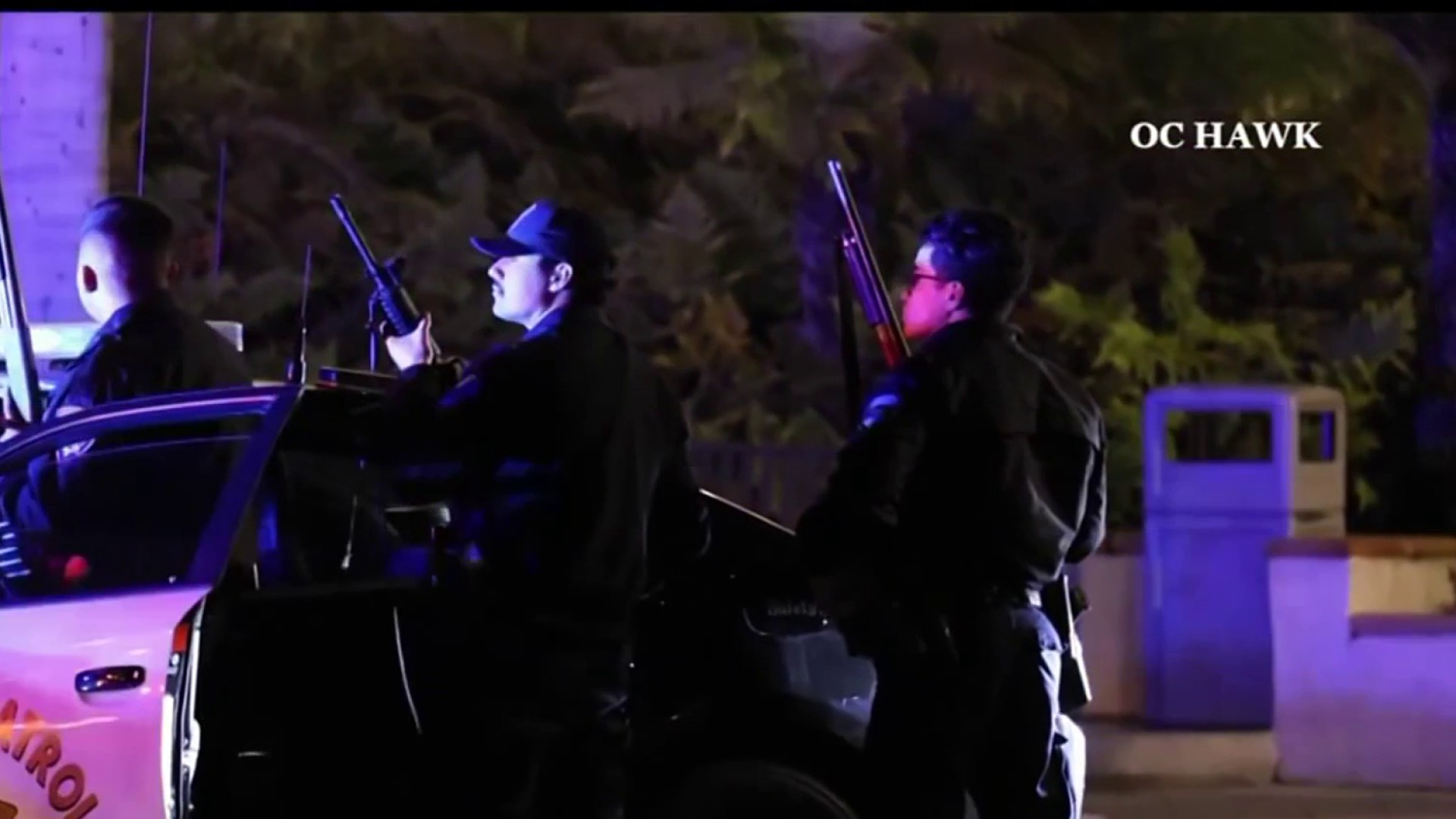Three days after alleged murderer Christopher Dorner was killed at a mountain cabin east of Los Angeles, San Bernardino County Sheriff's Department officials said the former police officer had died of a single gunshot wound to the head.
The former Los Angeles Police Department officer, whose alleged revenge-fueled shooting spree is thought to have caused the deaths of four people, died during a shootout and the burning down of a cabin in which he was barricaded Tuesday near Big Bear.
On Thursday afternoon, the sheriff's department positively identified the charred human remains found in the cabin as Dorner's. Officials said dental records were used during an autopsy to identify to the body, which was found in the cabin's basement.
At a news conference Friday, sheriff's Capt. Kevin Lacey said the autopsy showed Dorner's cause of death to be a single gunshot wound to the head. He said he would not speak about the "manner of death."
"The information we have right now seems to indicate that the wound that took Christopher Dorner's life was self-inflicted," Lacey said.
At the media event, Sheriff John McMahon stood by earlier statements that deputies had not intentionally set fire to the cabin where the standoff occurred.
He responded to questions about a recording from the scene of the firefight that seemed to indicate a desire on the part of officials to intentionally burn the cabin down. He said the department was trying to figure out who made the statement, and suggested it was someone "away from the tactical team."
Local
Get Los Angeles's latest local news on crime, entertainment, weather, schools, COVID, cost of living and more. Here's your go-to source for today's LA news.
"Our deputy sheriffs and the other officers that were present are human beings," McMahon said. "They had just been involved in probably one of the most fierce firefights. And sometimes, because we’re humans, we say things that may or may not be appropriate. We will look into this and we will deal with it appropriately."
Related: Dorner's Arsenal | Timeline: Revenge-Plot Slayings | Read: Full Manifesto | Map: Dorner Manhunt

McMahon also addressed questions about how it was possible for Dorner to hide out in a condominium complex in Big Bear just a few hundred yards from the manhunt command post. He said deputies had knocked on the condo complex's door and found it locked.
Seeing no signs of forced entry, they marked the property as searched, said McMahon, pictured at right. Authorities later learned that the couple who owned the property had left it unlocked and that Dorner had entered then locked the door behind him.
"My instructions were that … if it was secure and there were no signs of forced entry, we were not going to kick down the doors of several cabins or hundreds of cabins during that search," McMahon said.
When the condo owners entered the property Tuesday, Dorner allegedly tied them up and then stole their car. They were able to escape and alert authorities, who began the fast-paced search for Dorner.
After ditching the stolen car, the suspect then carjacked another driver. Dorner was soon spotted by a state wildlife officer who exchanged gunfire with the suspect on a mountain roadway.
Dorner fled on foot into the woods, eventually barricading himself in the cabin in the unincorporated Seven Oaks area on the other side of the mountains from Big Bear.
Deputies who responded were immediately fired upon, and two men went down. Capt. Detective Jeremiah MacKay was killed and another county deputy sheriff was seriously injured.
"Our officers had not even pulled their guns out at that point," McMahon said. "They were ambushed by Christopher Dorner."
Other responding officers were pinned down by gunfire from the cabin, Capt. Gregg Herbert said.
"Every time they tried to move, Dorner was shooting at them," Herbert said.
Eventually, the cabin was surrounded and authorities shot "cold gas" into the structure to try to get Dorner out, Herbert said. When there was "no movement," the team fired a pyrotechnic chemical agent into the structure to get the suspect out, he said.
"He did not surrender," Herbert said.

Part of a collection of aged vacation rental structures, the cabin caught on fire. Then authorities heard the sound of what they believe may have been Dorner killing himself.
"When about a quarter of the cabin was on fire, we heard a distinct single gunshot come from inside the house, which was a much different sounding shot from the shots he had been shooting at us, which to me indicated a different type of weapon was fired," Herbert said.
The cabin burned to the ground. Dorner's remains were removed and were in the county morgue Friday, officials said.
A cache of weapons found -- including a .308-caliber bolt action rifle with the word "Vengeance" on the butt, as shown above -- was being held as evidence.
McMahon said the "investigation is over as far as San Bernardino County is concerned," later adding that he didn't believe "we’ve made any mistakes at this point."
He said the department still does not know why Dorner ended up in Big Bear.
The search for Dorner began when he became the suspect in the fatal Feb. 3 shooting in Irvine of Keith Lawrence and his fiancée Monica Quan. An assistant basketball coach at California State University Fullerton, Quan was the daughter of a former LAPD captain who was targeted by Dorner in an 11,400-word angry manifesto that police said he published online.
In court documents obtained by NBC4, Irvine police Detective Alex Kim states in an affidavit (PDF) that Dorner is thought to have researched Quan and Keith before killing them. He is suspected of firing on the couple – found in their car in a parking garage – with so many 9 mm rounds that police believed he used a high-capacity magazine.
Two days after their deaths, Irvine police spoke with LAPD officials about Dorner, learning that Quan's father had represented the ex-officer during his disciplinary hearings and appeal of his 2008 firing.
"We also learned that Dorner appeared to harbor a grudge about losing his job as a police officer," Detective Jonathan Sampson wrote in a statement of probable cause.
Irvine police were in touch with LAPD after police in National City, southeast of San Diego, had found in a trash container police uniforms with a name badge for Officer Dorner, a high-capacity magazine and other gear.
National City police contacted the LAPD, where officials who were aware of the Irvine homicide investigation told them to get in touch with Irvine detectives.



